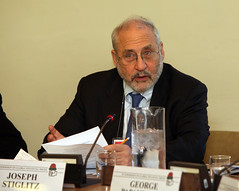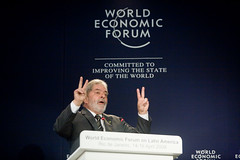 Image by ΠΑΣΟΚ via Flickr
Image by ΠΑΣΟΚ via FlickrDear You—
I have already expressed my doubts about conventional economics so I thought I would follow up by quoting Joseph Stiglitz’s argument verbatim. I’m a great admirer of Stiglitz who, despite his Nobel Prize, does not, I feel, get the attention he deserves. Needless to say, if economics currently worked as well as many economists seem to think it does, we wouldn’t have had the Great Recession and be in the economic pickle we are now. Read on and enjoy.
Needed: a new economic paradigm
By Joseph Stiglitz
The blame game continues over who is responsible for the worst recession since the Great Depression – the financiers who did such a bad job of managing risk or the regulators who failed to stop them. But the economics profession bears more than a little culpability. It provided the models that gave comfort to regulators that markets could be self-regulated; that they were efficient and self-correcting. The efficient markets hypothesis – the notion that market prices fully revealed all the relevant information – ruled the day. Today, not only is our economy in a shambles but so too is the economic paradigm that predominated in the years before the crisis – or at least it should be.
It is hard for non-economists to understand how peculiar the predominant macroeconomic models were. Many assumed demand had to equal supply – and that meant there could be no unemployment. (Right now a lot of people are just enjoying an extra dose of leisure; why they are unhappy is a matter for psychiatry, not economics.) Many used “representative agent models” – all individuals were assumed to be identical, and this meant there could be no meaningful financial markets (who would be lending money to whom?). Information asymmetries, the cornerstone of modern economics, also had no place: they could arise only if individuals suffered from acute schizophrenia, an assumption incompatible with another of the favoured assumptions, full rationality.
Bad models lead to bad policy: central banks, for instance, focused on the small economic inefficiencies arising from inflation, to the exclusion of the far, far greater inefficiencies arising from dysfunctional financial markets and asset price bubbles. After all, their models said that financial markets were always efficient. Remarkably, standard macroeconomic models did not even incorporate adequate analyses of banks. No wonder former Federal Reserve chairman Alan Greenspan, in his famous mea culpa, could express his surprise that banks did not do a better job at risk management. The real surprise was his surprise: even a cursory look at the perverse incentives confronting banks and their managers would have predicted short-sighted behaviour with excessive risk-taking.
The standard models should be graded on their predictive ability – and especially their ability to predict in circumstances that matter. Increasing the accuracy of forecast in normal times (knowing whether the economy will grow at 2.4 per cent or 2.5 per cent) is far less important than knowing the risk of a major recession. In this the models failed miserably, and the predictions of policymakers based on them have, by now, totally undermined their credibility. Policymakers did not see the crisis coming, said its effects were contained after the bubble burst, and thought the consequences would be far more short-lived and less severe than they have been.
Fortunately, while much of the mainstream focused on these flawed models, numerous researchers were engaged in developing alternative approaches. Economic theory had already shown that many of the central conclusions of the standard model were not robust – that is, small changes in assumptions led to large changes in conclusions. Even small information asymmetries, or imperfections in risk markets, meant that markets were not efficient. Celebrated results, such as Adam Smith’s invisible hand, did not hold; the invisible hand was invisible because it was not there. Few today would argue that bank managers, in their pursuit of their self-interest, had promoted the well-being of the global economy.
Monetary policy affects the economy through the availability of credit – and the terms on which it is made available, especially to small- and medium-sized enterprises. Understanding this requires us to analyse banks and their interaction with the shadow banking sector. The spread between the Treasury bill rate and lending rates can change markedly. With a few exceptions, most central banks paid little attention to systemic risk and the risks posed by credit interlinkages. Years before the crisis, a few researchers focused on these issues, including the possibility of the bankruptcy cascades that were to play out in such an important way in the crisis. This is an example of the importance of modelling carefully complex interactions among economic agents (households, companies, banks) – interactions that cannot be studied in models in which everyone is assumed to be the same. Even the sacrosanct assumption of rationality has been attacked: there are systemic deviations from rationality and consequences for macroeconomic behaviour that need to be explored.
Changing paradigms is not easy. Too many have invested too much in the wrong models. Like the Ptolemaic attempts to preserve earth-centric views of the universe, there will be heroic efforts to add complexities and refinements to the standard paradigm. The resulting models will be an improvement and policies based on them may do better, but they too are likely to fail. Nothing less than a paradigm shift will do.
But a new paradigm, I believe, is within our grasp: the intellectual building blocks are there and the Institute for New Economic Thinking is providing a framework for bringing the diverse group of scholars striving to create this new paradigm together. What is at stake, of course, is more than just the credibility of the economics profession or that of the policymakers who rely on their ideas: it is the stability and prosperity of our economies.




















